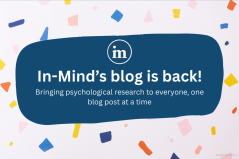Politics doesn’t define how most people see themselves
Politics doesn’t define how most people see themselves
The social groups to which we belong shape how we see ourselves, but which groups matter most? We show that political parties and ideology are not the first things that come to mind when people think about themselves. Instead, identities like nationality and age are far more central and may help bridge political divides. / more
Reality check: Call for abstracts for a special issue on clinical psychology and psychotherapy
Reality check: Call for abstracts for a special issue on clinical psychology and psychotherapy
This special issue Reality Check: What clinical science really tells us about promoting mental health aims to provide brief review articles on current developments in clinical psychology and psychotherapy research, presented in such a way that they are interesting and accessible to a wide readership of non-psychologists. / more
Why Christmas (feels like it) comes faster each year

keywords:
Christmas, time perception, Ramadan
Why Christmas (feels like it) comes faster each year
Christmas is just around the corner, and with it comes that familiar sense that time is speeding up. Do you feel the same way? In this blog post, you’ll learn why this might be the case. / more
Learning interdisciplinarity: The solution to societal challenges?

keywords:
Collaboration, learning, Interdisciplinarity, Sustainability, Teamwork
Learning interdisciplinarity: The solution to societal challenges?
Anyone who has worked in a team knows the challenges: differing perspectives often clash. However, what happens when it’s not just opinions that diverge, but entire disciplines? How can we learn to think beyond boundaries and what competencies can help us do so? / more
Does emotional labor also exist in sex?

keywords:
Emotional Labor, sexuality, gender roles
Does emotional labor also exist in sex?
Emotional labor refers to suppressing or altering one’s own feelings in order to enhance another person’s well-being. But does sex involve emotional labor? / more
In-Mind has relaunched its blog post
In-Mind has relaunched its blog post
We are excited to announce that the English version of In-Mind has relaunched its blog. The goal of In-Mind’s online blog is to communicate psychological research in a way that is scientifically accurate, accessible, and engaging for a broad readership. Articles span a broad spectrum of topics, with particular emphasis on current social, political, and scientific issues. Blog posts are 300–600 words long, with 1–5 scientific references. Posts summarize the results of an interesting publication, explain a psychological phenomenon, discuss... / more
Join the In-Mind team: Help us make psychology accessible to everyone!
Join the In-Mind team: Help us make psychology accessible to everyone!
What is In-Mind? In-Mind is a volunteer-driven project dedicated to sharing psychological research. We give researchers a platform to present their work in an engaging, accessible, and scientifically rigorous way—psychology by scientists, for everyone. Our journal publishes freely available articles across all areas of psychology. We are the English edition of In-Mind. The journal also publishes in German, French, Dutch, and Italian. Who are we looking for? We are seeking active researchers across all stages of an academic career and... / more
Resumé under the X-ray: What a CV really reveals about personality

keywords:
CV, Resumé, personality, Big Five, Narcissism
Resumé under the X-ray: What a CV really reveals about personality
CVs are more than lists of experiences and qualifications – they tell a story. But can they also provide cues about a person’s personality? To investigate this question, a study examined 141early-career professionals [1]. They completed personality tests on the Big Five and narcissism and submitted their CVs. The question: Which pieces of information in these CVs reveal something about their personality? The answer: There are cues, but they are subtle. / more
Chronic loneliness: Why loneliness can make us even lonelier

keywords:
loneliness, social isolation, cognitive bias, adolescents, mental health
Chronic loneliness: Why loneliness can make us even lonelier
Loneliness can be more than a temporary feeling . For some, it becomes an invisible vicious cycle. Chronically lonely people experience social exclusion more intensely and find less joy in social interactions. They fall into cognitive traps that block the way out of isolation. This can have serious consequences, especially for adolescents. But how does this vicious cycle develop –and more importantly, how can it be broken? / more
Why it takes more than the occasional ‘sorry’: How frequency and quality of apologies shape our relationships
Why it takes more than the occasional ‘sorry’: How frequency and quality of apologies shape our relationships
Missteps and hurt feelings are often unavoidable in romantic relationships. While some individuals are quick to fully admit their mistakes, others are more reserved. But how does the way we apologize affect our relationships? / more





